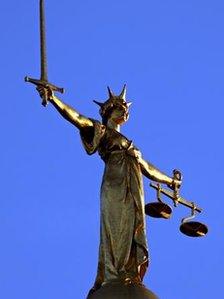Judges rule CRB checks 'incompatible' with Human Rights Act
- Published

CRB checks require the disclosure of all criminal convictions or cautions, regardless of their relevance to the job.
Blanket criminal records checks are not "compatible" with a key part of the Human Rights Act, the Court of Appeal has concluded.
The checks, known as CRBs, may prevent a persons right to a private or family life, a draft judgement has found.
The ruling was made based on the case of a 21-year-old man, who had been forced to reveal details of two police warnings given to him a decade earlier.
The Master of the Rolls, Lord Dyson, said the CRB system must be reformed.
The draft judgement was made on 21 December 2012, but was not revealed at the time amid concerns about its implications for the government over the CRB system.
CRBs require the automatic disclosure of all convictions and cautions to certain employers, regardless of their relevance to the job.
'Pull finger out'
In the case of the unnamed 21-year-old, known as "T", he had been forced to reveal he had received warnings from Manchester Police in connection with two stolen bikes.
He was 11-years-old at the time of the alleged offences.
"T" had been CRB checked when he applied for a part-time job at a local football club aged 17 and later for a university course in sports studies.
At the hearing at the Court of Appeal on Friday, Lord Dyson insisted the government should "pull its finger out" over the issue, which he claimed they had known about for some time.
The court said it hoped to deliver a formal judgement next week.
'Proportionate system'
The "T" case had been supported by human rights campaigners Liberty.
Corinna Ferguson, legal officer for Liberty, said: "The overzealous CRB system has allowed old, minor and unreliable information to wreck the lives of too many hardworking people in the UK.
"The government can't put off dealing with this any longer. We look forward to seeing urgent proposals for a proportionate system that properly balances the aim of public protection with privacy rights."
CRB checks are governed by the Police Act 1997 and the Rehabilitation of Offenders Act 1974 (Exceptions) Order 1975.
For some types of work, especially involving children and vulnerable adults, an employer may request an enhanced or standard CRB check.
In March 2012, new figures from the criminal records bureau revealed the the checks had prevented more than 130,000 unsuitable people, including rapists and paedophiles, from working with children or vulnerable groups.
A government-backed review into CRB checks last year recommended the introduction of a "filter" to remove old and minor conviction information from the checks.
But the coalition has not yet announced any intention to introduce such a system.
Related topics
- Published26 March 2012
- Published10 February 2012
- Published9 February 2012